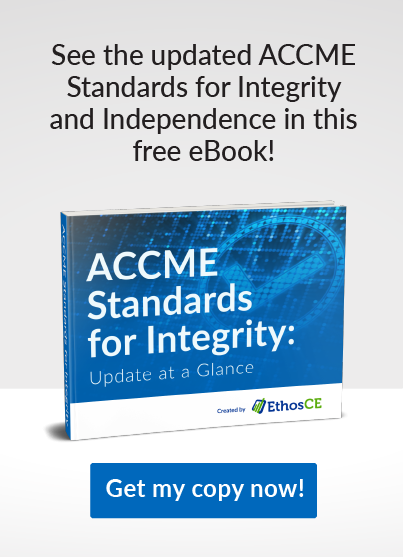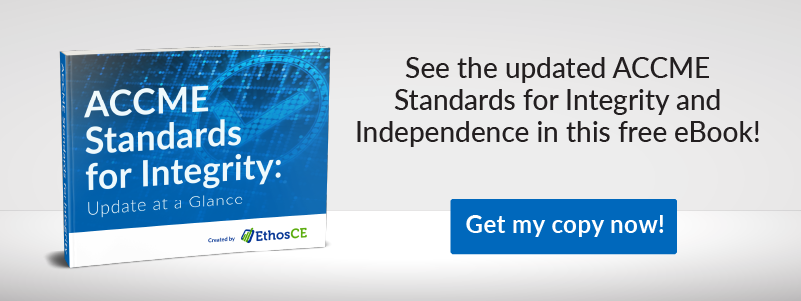What to Know about ACCME Financial Disclosures
Many of your healthcare professionals have relationships with ineligible companies, whether it’s for products or services or with firms that have ineligible companies as clients. As a CME provider, coordinator, or director, it’s up to you to identify any relevant financial relationships between individuals who are in control of educational content and those who are also in relationships with ineligible companies. You have to ensure that they don’t introduce conflicts of interest into your continuing education—this means financial relationships that are defined as relevant when the educational content is related to the ineligible company’s products or services. Let’s look at the changes surrounding the ACCME financial disclosure and what you should know.
Financial Relationships with Ineligible Companies
When you’re involved in CME as a provider, coordinator, or director, you’re responsible for following ACCME-dictated standards for financial disclosures. This falls under Standard 3 of the new Standards for Integrity and Independence in Accredited Continuing Education. There are now steps that you must take to comply with this Standard during the transition period from January 1, 2021, and January 1, 2022.
What will you have to do? What should you know about the ACCME financial disclosure?
Handle All Disclosures from the Past 24 Months
One of the new ACCME financial disclosure changes regards how disclosures are handled. Speakers are asked to disclose their relevant financial relationships with (ineligible) companies whose main focuses are the production, marketing, sale, resale, or distribution of healthcare products, the intended use for which would be on or by patients. Before the ACCME change, this time period was for only the past twelve months.
Now, faculty and planners are required to disclose all their financial relationships with ineligible companies from the past twenty-four months. You must be sure that these disclosures include the name of the ineligible company and the financial nature of that company. One Standard change also involves that of a faculty or planner’s partner or spouse: these no longer need to be disclosed.
Disclose All Relevant Financial Relationships to Your Learners Before the Accredited Educational Activity
Among the changes in dealing with financial relationships is how you disclose these relationships to your learners. You must provide them with the names of the individuals involving financial relationships, along with the names of the ineligible companies with which they have those relationships.
Additionally, you’ll have to inform your learners about the nature of those relationships and a statement that all relevant financial relationships were mitigated.
What else do you need to do?
You’ll have to identify ineligible companies by their names only. The ACCME financial disclosure to learners must not include these companies’ corporate or product logos, trade names, or product group messages.
In addition, you must disclose the absence of relevant financial relationships, informing learners about planners, faculty, and presenters in control of content, whether they’re individuals or part of a group. They will need to know that there are no relevant financial relationships with ineligible companies. Plus, your learners must receive this disclosure information in a format that can be verified at the time of accreditation before attending the accredited education.
Collect and Collect Even More
You’ll need to collect information from all planners, faculty, and others who are in control of your educational content. You no longer just collect information from the past twelve months; with the new ACCME Standards beginning on January 1, 2022, you’ll have to do so for the past twenty-four months.
Who should be excluded?
Ensure that you review your information about financial relationships to identify individuals who are owners or employees of ineligible companies. They must be excluded from controlling content or participating as planners or faculty in accredited education. However, exceptions do exist when employees of ineligible companies can participate as planners or faculty.
Mitigate Relevant Financial Relationships
When it comes to mitigating relevant financial relationships, you must take steps to prevent those individuals with relevant financial relationships from placing any commercial bias into the content. It’s your responsibility to mitigate these individuals before they begin their roles as planners or faculty members. You’ll also have to document the steps that you’ve taken to mitigate these financial relationships. For example, the steps that you would take for planners would be different for faculty and occur before planning begins.
What Are the Exceptions?
For accredited providers, several exceptions exist when it comes to identifying, mitigating, or disclosing relevant financial relationships. You’ll no longer need to do so for any of the following activities:
- Any accredited education that’s non-clinical, such as leadership or communication skills training
- Accredited education where the learner group is in control of the content, such as a spontaneous case conversation among peers
- Accredited self-directed education where learners control their educational goals and report on changes that resulted, such as learning from teaching, remediation, or a personal development plan
As an accredited provider, if you serve as a source of information for self-directed learners, you should direct the learners only to resources for learning that aren’t controlled by ineligible companies.
Healthcare Professionals and Their Relationships
Many of your healthcare professionals already have relationships with ineligible companies. However, ACCME’s Standards for Integrity and Independence in Accredited Continuing Education spell out what you must do to address this issue when it comes to ACCME financial disclosure.
At EthosCE, we understand the challenges of staying up to date and compliant with ACCME changes. We know how critical it is to get things done right the first time when it comes to team-based education and success.
To learn how EthosCE can enhance the continuing education of your healthcare teams, schedule a free 1-on-1 demo with one of our specialists today!
 We're now part of the Cadmium product suite! Learn more
We're now part of the Cadmium product suite! Learn more 


